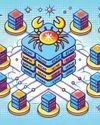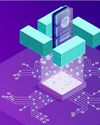
Data is a collection of representation of facts as text (news), numbers (figures), graphics (datasheet), images, sound or video. Information is data in context. Without a context, data is absolutely meaningless or clueless to interpret; we create meaningful information by interpreting the context around data collected from different sources. The resulting information helps to take decisions. So, data architecture (DA) is an integral component for defining the information architecture (IA); it is concerned with the design and intent to use data in a given structured format (like databases or data sources and file systems). A data architect models the data in stages (conceptual, logical and physical), and must relate the data to each process that consumes (uses) it.
IA is the starting point for data modelling, design, and development to support business process needs. Any new models or changes to existing models must be consistent with the definitions of existing information objects. IA imposes coherence and consistency in both the definition and use of common data objects. Data management involves data architecture, information architecture, data management and governance, data security and data life cycle management.
Modern data analytics and management require high resources like CPU, memory and storage, and it is a costly investment to handle this on-premises. A cloud platform easily enables agility, scalability, reliability, availability and security for data management solutions.
Data analytics in the sports industry
この記事は Open Source For You の May 2023 版に掲載されています。
7 日間の Magzter GOLD 無料トライアルを開始して、何千もの厳選されたプレミアム ストーリー、9,000 以上の雑誌や新聞にアクセスしてください。
すでに購読者です ? サインイン
この記事は Open Source For You の May 2023 版に掲載されています。
7 日間の Magzter GOLD 無料トライアルを開始して、何千もの厳選されたプレミアム ストーリー、9,000 以上の雑誌や新聞にアクセスしてください。
すでに購読者です? サインイン

Helgrind: Detecting Synchronisation Issues in Multithreaded Programs
Let's explore how Helgrind can be used to detect and debug multithreading issues with the help of a multithreaded C program.

The Perfect Process of Booting a PC
Booting a PC seems as simple as eating a cake. But are you aware of all that goes on behind-the-scenes to bake a delicious cake or seamlessly boot a PC?

Exploring eBPF and its Integration with Kubernetes
eBPF, a game-changing technology that extends the capabilities of the Linux kernel, offers significant advantages for Kubernetes networking. It also greatly improves Kubernetes observability by capturing detailed telemetry data directly from the kernel. Read on to find out how its integration with Kubernetes has immense benefits.

Deploying Generative AI LLMs on Docker
Built on massive datasets, large language models or LLMS are closely associated with generative Al. Integrating these models with Docker has quite a few advantages.

Containerisation: The Cornerstone of Multi-Cloud and Hybrid Cloud Success
Open source containerisation software provides the flexibility, cost-effectiveness, and community support needed to build and manage complex multi-cloud and hybrid cloud environments. By leveraging this software, businesses can unlock the full potential of multicloud and hybrid cloud architectures while minimising vendor lock-in risks.

From Virtual Machines to Docker Containers: The Evolution of Software Development
Containerisation and Kubernetes have eased software development, making it faster and better. Let's see where these are headed, looking at trends that are making life easier for developers.

India's Leap in Supercomputing: Innovating for Tomorrow
As India strides towards self-sufficiency in supercomputing, embracing this evolution isn't just an option-it is pivotal for global competitiveness and technological leadership.

SageMath: A Quick Introduction to Cybersecurity
In the previous articles in this SageMath series, we delved into graph theory and explored its applications using SageMath. In this seventh article in the series, it is time to shift our focus to another crucial subfield of computer science: cybersecurity and cryptography.

Efficient Prompt Engineering: Getting the Right Answers
OpenAl's GPT-3 and GPT-4 are powerful tools that can generate human-like text, answer questions, and provide insights. However, the quality of these outputs depends heavily on how you frame the input, or prompt. Efficient prompt engineering ensures you get the right answers by designing inputs that guide the AI towards relevant, clear, and useful responses. Let's find out how to craft effective prompts with examples.

Analysing Linus Torvald's Critique of Docker
This article looks at Docker's security flaws, particularly its shared-kernel model, and contrasts it with traditional VMs for better isolation. It discusses Linus Torvalds' concerns, explores mitigation techniques, and proposes a roadmap for building a more secure containerisation platform using hardware-assisted virtualisation, true isolation, and a robust orchestration layer.